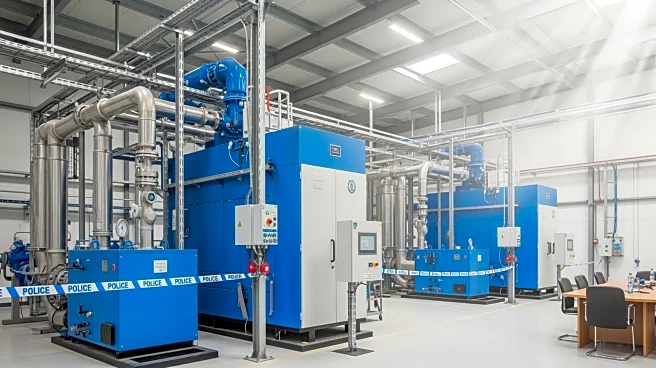What's Happening?
E.ON Energy Infrastructure Solutions is advocating for the use of Combined Heat and Power (CHP) systems in the food processing industry to enhance sustainability and reduce emissions. CHP systems utilize
a company's primary energy source, such as natural gas, to produce both electrical and thermal energy efficiently on-site. This approach is particularly beneficial for food processing companies due to their high demand for simultaneous heat and electricity, especially for facilities operating continuously at high capacity. The implementation of CHP systems can significantly reduce energy losses and emissions, offering a more cost-effective solution compared to traditional power plants. E.ON has partnered with various companies in the food and beverage sector to design and operate energy solutions that balance sustainability, security of supply, and commercial viability.
Why It's Important?
The adoption of CHP systems in the food processing industry is crucial for meeting stringent environmental regulations and achieving net-zero emission targets. By reducing energy losses and emissions, CHP systems provide a sustainable and cost-effective energy solution for businesses. This is particularly important as the food and beverage industry is one of the most energy-intensive sectors, consuming significant amounts of energy at various stages of its value chain. The shift towards CHP systems can help companies reduce their carbon footprint and move towards zero-emission goals, which is increasingly important in the context of rising energy costs and stricter environmental regulations.
What's Next?
E.ON's initiatives, such as the project with Arcobräu Brewery, demonstrate the potential for CHP systems to utilize biogas and other sustainable energy sources. The brewery uses wood gas, derived from forest residues and waste wood, to fuel its manufacturing processes, showcasing a climate-positive approach. This model not only reduces reliance on natural gas but also contributes to sustainability by utilizing waste-to-energy solutions. As more companies in the food processing industry explore CHP systems, there is potential for widespread adoption of biogas and other biofuels, accelerating the industry's progress towards net-zero targets.
Beyond the Headlines
The implementation of CHP systems in the food processing industry highlights the broader trend towards sustainable energy solutions. By leveraging biogas and other renewable energy sources, companies can achieve significant reductions in emissions and energy costs. This shift also underscores the importance of innovative energy solutions in meeting environmental goals and enhancing operational efficiency. As the industry continues to evolve, the integration of CHP systems could lead to long-term shifts in energy consumption patterns and sustainability practices.









